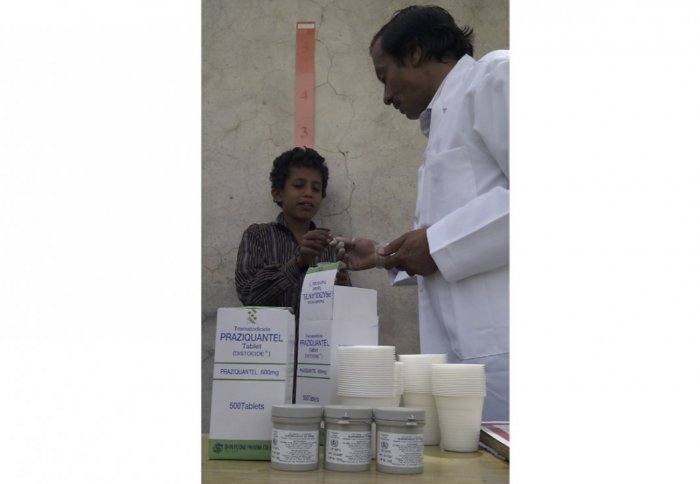Update: Yemen Schistosomiasis Control Project

Yemen's Schistosomiasis Control Project is meeting its targets under the most difficult of situations. Report in from the 7th Technical Meeting
SCI staff, amongst others, have been prohibited from travelling to Yemen since early 2015 when the Foreign and Commonwealth Office (FCO) suspended operations and all diplomatic staff were withdrawn. FCO continues to advise against all travel to the country. Unable to meet in Yemen the 7th technical meeting took place in Amman, Jordan between 28-30 April 2016. Participants included Ministry of Public Health and Population, Republic of Yemen (MoPH&P), World Bank (WB), The END Fund, SCI, HPP Project Administration Unit, Global Schistosomiasis Alliance, Liverpool School of Tropical Medicine, and WHO.
The Director of the SCH/STH Control Programme in Yemen, Sami Al-Haidari, updated partners on the mass drug administration treatment campaign which took place from 18-21 April 2016.
The campaign targeted 402,338 school-aged children (SAC - 256,550 enrolled and 145,788 non-enrolled) for treatment in 20 districts in 6 governorates (Al-Dalee, Abyan, Alhodeidah, Amran, Hajjah, and Al-Jowf). A total of 356,803 individuals were treated: 200,021 males (56%) and 156,782 females (44%). Overall coverage was excellent considering the security situation in the country. 89% of the overall targeted population received treatment, while coverage of enrolled SAC was considerably higher (94%) when compared with 79% of non-enrolled SAC.
Preparations for the campaign included the training of 1,131 people: 1,006 drug distributors and 125 team leaders across a total of 503 teams. A total of 3,409 treatment sites were used, 215 in health facilities, 983 schools, and 2,211 mobile sites. A total of 788,190 praziquantel (2.2. tablets per person for SCH) and 357,027 albendazole tablets (for STH) were used during the campaign. Cost per treatment was calculated at US$0.50 per person excluding drugs and US$0.65 per person including drugs.
The achievements reported are even more impressive considering the World Bank (WB), the principal funder of the SCH and STH control programme in Yemen, suspended all disbursements to all projects in the country. It is the sheer determination and dedication of MoPH&P staff and all involved in the treatment of SCH and STH that has ensured activities have gone ahead.
Dr Abdulsalam Al-Mekhlafi from the University of Sana’a provided the preliminary results of the partial Impact Evaluation (IE) surveys which were carried out prior to the April 2016 treatment round. It was only possible to collect samples from 15 or the 37 country wide sentinel sites in 4 governorates. A total of 3,372 children were sampled across all 15 sites (average of 225 per site). The results from this IE survey will be compared to the data from the same sites recorded at baseline and during the mid-line survey in order to understand the changes in infection levels. These results will demonstrate unequivocally the positive impact treatment is having, reducing prevalence and intensity of schistosomiasis (urogenital and intestinal) across Yemen.
Due to the suspension of the programmes there is an estimated US$3m underspend in the schistosomiasis control project. In addition, approximately 12 million tablets of praziquantel are currently in country ready for distribution. The WB has made the following recommendations to the MoPH&P: not use any of the remaining funds to procure more drugs but rather request drugs from the Merck/WHO donation programme. This would, in addition to reducing the cost per treatment, engage a new partner, increasing further the partnership approach of the project which has proven to be very successful. The WB recommend the underspend be used in its entirety to cover operational costs.
Sadly, there are no obvious signs that the political situation in Yemen will resolve itself imminently. However, the results presented at the 7th technical meeting of the Yemen Schistosomiasis Control Project and the discussions and planning that took place provide a strong indication that the project will continue to surprise us by how much it is able to achieve in the most adverse circumstances.
Article text (excluding photos or graphics) © Imperial College London.
Photos and graphics subject to third party copyright used with permission or © Imperial College London.
Reporter
Mrs Alexandra Grainger
School of Public Health